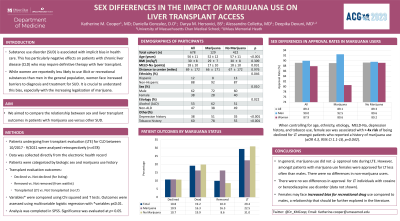Tuesday Poster Session
Category: Liver
P3849 - Sex Differences in the Impact of Marijuana Use on Liver Transplant Access
Tuesday, October 24, 2023
10:30 AM - 4:00 PM PT
Location: Exhibit Hall

Has Audio

Katherine M. Cooper, MD
UMass Chan Medical School
Worcester, MA
Presenting Author(s)
Katherine M.. Cooper, MD, Daniella Gonzalez, MD, Darya M. Herscovici, BS, Alessandro Colletta, MD, Deepika Devuni, MD
UMass Chan Medical School, Worcester, MA
Introduction: Substance use disorder (SUD) is associated with implicit bias in health care settings. This has particularly negative effects on patients with chronic liver disease (CLD) who may require definitive therapy with liver transplant. While women may be less likely to use illicit or recreational substances compared to men in the general population, women may face increased barriers to diagnosis and treatment for SUD. It is crucial to understand this bias, especially with the increasing legalization of marijuana. We aimed to compare the relationship between sex and liver transplant outcomes in patients with marijuana use versus other SUD.
Methods: Patients undergoing liver transplant evaluation (LTE) for CLD between 10/2017 - 9/2021 were retrospectively analyzed (n=678; 256 females, 422 males). History of recreational and illicit drug use were collected in addition to patient demographic factors. Outcomes included declined vs. not declined (for listing), removed vs. not removed (from waitlist) and LT vs. no LT. Data was compared using chi squared and t tests. The relationship between drug use and patient outcome was assessed using logistic regression. Analysis was completed in SPSS. Significance was determined as p< 0.05.
Results: 129 patients reported history of marijuana use, and this was more common in males compared to females (22% vs 14%, p=0.01). Patients with and without a history of marijuana use were declined at similar rates (11% vs 11%, p=0.92). However, of those that reported marijuana use, females were more likely to be declined for listing than males (19% vs. 7%. p=0.05). When controlling for age, ethnicity and etiology, female sex was associated with a 3.5x risk of being declined for LT. Once listed, marijuana was associated with reduced LT and more wait list removal, but these did not differ by sex. There were no sex differences in rate of decline during LTE in patients who reported opioid (p=0.41), cocaine (p=0.86), or benzodiazepine use (p=0.75).
Discussion: While marijuana did not impact listing for LT, female patients with marijuana use were more negatively affected than males regarding LT access. This was not observed for more explicit substances including cocaine, and benzodiazepines which were associated with higher risk of being declined than marijuana in our study. It is possible that women face increased bias for recreational but not illegal drug use compared to males, a relationship that should be further explored in the literature.
Disclosures:
Katherine M.. Cooper, MD, Daniella Gonzalez, MD, Darya M. Herscovici, BS, Alessandro Colletta, MD, Deepika Devuni, MD. P3849 - Sex Differences in the Impact of Marijuana Use on Liver Transplant Access, ACG 2023 Annual Scientific Meeting Abstracts. Vancouver, BC, Canada: American College of Gastroenterology.
UMass Chan Medical School, Worcester, MA
Introduction: Substance use disorder (SUD) is associated with implicit bias in health care settings. This has particularly negative effects on patients with chronic liver disease (CLD) who may require definitive therapy with liver transplant. While women may be less likely to use illicit or recreational substances compared to men in the general population, women may face increased barriers to diagnosis and treatment for SUD. It is crucial to understand this bias, especially with the increasing legalization of marijuana. We aimed to compare the relationship between sex and liver transplant outcomes in patients with marijuana use versus other SUD.
Methods: Patients undergoing liver transplant evaluation (LTE) for CLD between 10/2017 - 9/2021 were retrospectively analyzed (n=678; 256 females, 422 males). History of recreational and illicit drug use were collected in addition to patient demographic factors. Outcomes included declined vs. not declined (for listing), removed vs. not removed (from waitlist) and LT vs. no LT. Data was compared using chi squared and t tests. The relationship between drug use and patient outcome was assessed using logistic regression. Analysis was completed in SPSS. Significance was determined as p< 0.05.
Results: 129 patients reported history of marijuana use, and this was more common in males compared to females (22% vs 14%, p=0.01). Patients with and without a history of marijuana use were declined at similar rates (11% vs 11%, p=0.92). However, of those that reported marijuana use, females were more likely to be declined for listing than males (19% vs. 7%. p=0.05). When controlling for age, ethnicity and etiology, female sex was associated with a 3.5x risk of being declined for LT. Once listed, marijuana was associated with reduced LT and more wait list removal, but these did not differ by sex. There were no sex differences in rate of decline during LTE in patients who reported opioid (p=0.41), cocaine (p=0.86), or benzodiazepine use (p=0.75).
Discussion: While marijuana did not impact listing for LT, female patients with marijuana use were more negatively affected than males regarding LT access. This was not observed for more explicit substances including cocaine, and benzodiazepines which were associated with higher risk of being declined than marijuana in our study. It is possible that women face increased bias for recreational but not illegal drug use compared to males, a relationship that should be further explored in the literature.
Disclosures:
Katherine Cooper indicated no relevant financial relationships.
Daniella Gonzalez indicated no relevant financial relationships.
Darya Herscovici indicated no relevant financial relationships.
Alessandro Colletta indicated no relevant financial relationships.
Deepika Devuni: NIAAA (AA017986) – Grant/Research Support. Sequana Medical – Grant/Research Support.
Katherine M.. Cooper, MD, Daniella Gonzalez, MD, Darya M. Herscovici, BS, Alessandro Colletta, MD, Deepika Devuni, MD. P3849 - Sex Differences in the Impact of Marijuana Use on Liver Transplant Access, ACG 2023 Annual Scientific Meeting Abstracts. Vancouver, BC, Canada: American College of Gastroenterology.
